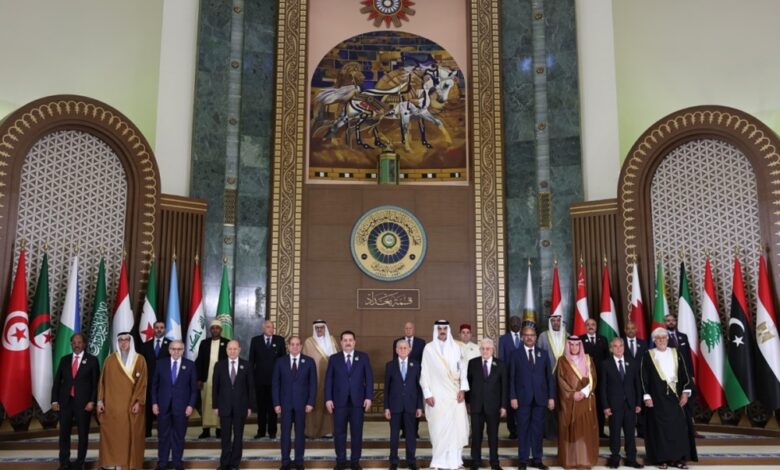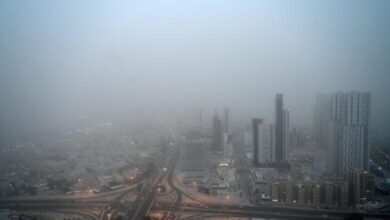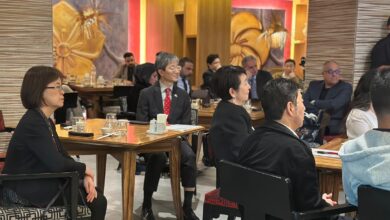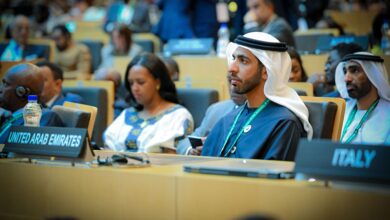
Under the shadow of mounting regional tensions and humanitarian crises, the 34th Arab League Summit convened in Baghdad on Saturday, drawing limited representation from Gulf countries but significant attention to urgent regional challenges — chief among them, the situation in Gaza.
Foreign ministers from Kuwait, Bahrain, Oman, and Saudi Arabia led their respective delegations in a summit described by Iraqi President Abdul Latif Rashid as occurring amid “grave challenges that threaten our region, the security of our countries, and the fate of our peoples.”
In his opening address, President Rashid emphasized the summit’s strategic timing, taking place just two months after an emergency summit in Cairo. “The ultimate goal of holding our summit today is to unify our positions on the growing challenges, out of our belief in the importance of joint action, which prioritizes the supreme national interest,” he said. UN Secretary-General António Guterres also attended the summit, reports the news agencies.
The summit’s centerpiece was the “Baghdad Declaration,” a comprehensive document covering political, economic, and developmental themes. The first and most urgent section reaffirmed the centrality of the Palestinian cause, demanding an immediate end to the war in Gaza and calling on the international community — especially influential nations —to fulfill their moral and legal responsibilities by halting violence and facilitating the flow of humanitarian aid.
The declaration voiced outright rejection of any plans to displace Palestinians and backed the Arab-Islamic joint initiative for Gaza’s reconstruction, originally adopted at the Cairo emergency summit and endorsed by the Organization of Islamic Cooperation in Jeddah. It further welcomed proposals to establish a reconstruction fund and called for the urgent formation of a working group — cooperating with the UN — to support Gaza’s 40,000 orphans.
Arab leaders also endorsed Palestinian President Mahmoud Abbas’s call for an international peace conference to implement the two-state solution in line with the Arab Peace Initiative and UN resolutions. They called for deploying UN peacekeeping forces in the occupied territories and urged the UN Security Council to take definitive action.
The declaration praised the recent recognition of the State of Palestine by Spain, Norway, and Ireland, and reaffirmed support for South Africa’s lawsuit against Israel at the International Court of Justice.
Turning to Syria, the Baghdad Declaration called for a national dialogue inclusive of all Syrian factions, affirming respect for Syria’s sovereignty and unity. It condemned Israeli strikes on Syrian territory and welcomed Iraq’s offer to host a national reconciliation conference under Arab League coordination.
The declaration also noted the recent decision to ease U.S. sanctions on Syria and reiterated the Arab League’s support for a peaceful political transition that preserves Syria’s diversity and national cohesion.
In Lebanon, the summit encouraged political consensus and economic reforms, welcomed municipal elections, and expressed full support for Lebanese sovereignty.
For Yemen, leaders emphasized the need to preserve unity and end conflict through internal dialogue. On Sudan, the declaration called for safe humanitarian corridors and endorsed regional peace initiatives, including the Jeddah Declaration and the IGAD’s recent statement promoting a unified platform for negotiations.
In Libya, the declaration rejected foreign interference and called for the withdrawal of mercenaries within a set timeframe, urging all parties to advance national reconciliation.
The summit also backed Somalia’s territorial integrity and reiterated support for the UAE’s sovereignty over the islands of Greater and Lesser Tunb and Abu Musa, urging Iran to engage in peaceful negotiations or seek international arbitration.
The summit stressed the need for a nuclear-weapon-free Middle East and emphasized water security as a pillar of Arab national security. The declaration lauded Iraq’s efforts in combating terrorism and called for intensified measures against hate speech, extremism, and transnational crimes, including human trafficking and money laundering.
On broader geopolitical tensions, the declaration expressed concern over the decline of diplomacy and the rise of force-based conflict resolution. Arab leaders endorsed ongoing negotiations between the U.S. and Iran regarding the nuclear file and commended Oman’s mediating role.
The second section of the Baghdad Declaration reflected the outcomes of the Fifth Arab Development Summit. Leaders adopted the “Blue Economy” initiative proposed by Mauritania, aiming to ensure food and energy security by sustainably managing marine resources.
Other initiatives included the Arab Artificial Intelligence Initiative, with Iraq hosting a new Arab Center for AI in Baghdad; the Council of Arab Trade Ministers, proposed by Iraq; Egypt’s initiative on disease control; UAE’s “Creating Hope” project; the Arab Food Security Strategy (2025–2035); a project for supporting displaced Palestinian families; the Arab Water Security Strategy (2030) and a plan for reforming vocational and technical education across Arab countries.
The declaration called for lifting sanctions on Syria’s energy and electricity sectors and emphasized accelerating reconstruction and development projects in Yemen and Sudan.
Iraq presented 15 forward-looking initiatives during the summit, including the Arab Humanitarian and Development Support Initiative, founding the Arab Fund for Recovery and Reconstruction; the Arab Pact in Support of the Syrian People, advocating a peaceful transition and human rights protection; a proposed international conference for Syria’s reconstruction and dignified return of refugees; the Development Roadmap for Arab economic cooperation; the Arab Food Security from Grains initiative; establishment of the Arab Center for AI and Advanced Techno; the Arab Water Resources Protection Alliance; the Baghdad Environmental Initiative to address climate change and post-war environmental damage; the Arab Center for Combating Terrorism and Violent Extremism and the Joint Arab Security Coordination Room for collective crisis response.
Despite the limited Gulf leadership presence, the 34th Arab League Summit in Baghdad marked a critical juncture for Arab unity and regional diplomacy. With the “Baghdad Declaration” as its roadmap, Arab leaders charted a course toward humanitarian relief, political reconciliation, and development cooperation—underscoring a collective resolve to confront the region’s overlapping crises.












